#caesar's invasions of britain
Text

Seventeenth-century English antiquarians thought that Stonehenge was built by Celtic Druids. They were relying on the earliest written history they had: Julius Caesar’s narrative of his two unsuccessful invasions of Britain in 54 and 55 BC. Caesar had said the local priests were called Druids. John Aubrey (1626–1697) and William Stukeley (1687–1765) cemented the Stonehenge/Druid connection, while self-styled bard Edward Williams (1747–1826), who changed his name to Iolo Morganwg, invented “authentic” Druidic rituals.
Druidism has come a long way since. In 2010, The Druid Network was listed as a charity in England and Wales, essentially marking the official recognition of Druidism as a religion. (74,000 called themselves Druids in a recent census.) Historian Carole M. Cusack positions Druidism as one of the branches of the tree of Paganism and/or New Age-ism(s), which burst into all sorts of growth during the twentieth century. Modern Druidism fits into the smorgasbord of what Cusack calls the “deregulated spiritual marketplace” of our times.
But there’s a disconnect here. In the popular imagination, Stonehenge and Druidism now go together like tea and crumpets. Historically, Stonehenge, a product of Neolithic Britain, predates Caesar by thousands of years. It had nothing to do with Druids and certainly nothing to do with modern Druidism.
“The false association of [Stonehenge] with the Druids has persisted to the present day,” Cusak writes, “and has become a form of folklore or folk-memory that has enabled modern Druids to obtain access and a degree of respect in their interactions with Stonehenge and other megalithic sites.”
Learn more from our friends at JSTOR Daily in “Stonehenge Before the Druids (Long, Long, Before The Druids)” by Matthew Wills.
Image credit: Spectators gather at Stonehenge to watch a group of Druids carry out the Dawn Ceremony on the summer solstice, or longest day of the year, 1956. Getty.
400 notes
·
View notes
Text
More notes on the development of Roman imperialism and colonialism:
Rome began as a city warring with other cities and city-states in Italy. Its growth was haphazard and, in some ways, accidental. They don't seem to have thought of it as an "empire" in the sense of "our land and sea," until the 1st century BCE.
Before then, the Roman empire was characterized by active military control, not by thinking of lands as "Roman territory." This was not the USA trying to grab all the land it could in manifest destiny; this was a city-state that primarily aimed to enrich and defend itself, and often used military occupation to do so.
The Romans did not like to think of themselves as an expansionist power, but as fighting defensive wars for themselves and their allies. However, the Roman system of alliance building - and sometimes provoking other countries - frequently "pulled" Rome into wars anyway. And Roman generals who really wanted a war could often invent justifications for it. Caesar's conquest of Gaul is one of many wars that started as "protecting an ally from invasion" but which soon became opportunistic power-grabs.
Even so, this self-concept as "defenders" partly explains why the Romans mostly left defeated Italian communities intact, only demanding troop levies and sometimes confiscating part of the land. Draining conquered peoples dry or wiping them out was not the goal, and the Romans actually prided themselves on being relatively "merciful" to their neighbors (by classical standards). However, as Rome's sphere of influence grew, and the distance from Rome to defeated (and potentially rebellious) communities increased, they began stationing permanent military outposts in certain regions.
Roman colonies originated as military outposts. They served a quadruple purpose: 1) to punish communities that had rebelled or fought wars against Rome; 2) to reward Roman veterans; 3) to relieve economic tensions in Rome itself; and 4) to suppress further rebellion by maintaining Roman outposts in the region.
This is in contrast to Greek and Phoenician colonies, which were usually established by traders, and the USA's westward expansion, which aimed to replace indigenous peoples en masse.
Similarly, the word "province" originally referred to a task or assignment, not a geographic area. A proconsul might be assigned the "province" of Spain of Sicily in the sense of "keep this region from revolting."
Economic exploitation came later. The Punic Wars marked a turning point in which Rome stationed generals overseas for extended periods of time to prevent insurgency among subject peoples, not Italian allies who were acknowledged as mostly self-governing. These generals had immense latitude to do as they saw fit, and with the promise of armed protection, Roman businessmen soon saw opportunities for mining, slave plantations, and more. This is also why Spain, Sicily, and certain other regions were abused much more harshly than Italy itself.
In the 1st century BCE we see a slow shift toward conquest of lands being sought for its own sake, rather than as a by-product of war. By the reign of Augustus, writers imagined Rome conquering the whole world.
Julius Caesar's conquest of Gaul occurred midway through this ideological shift. Hence he felt the need to justify his conquest by presenting his side of the story in his Commentaries, but the public response to his needless invasion of Britain was overwhelmingly positive. Conquest, if successful, was beginning to justify itself.
However, the Romans also gradually came to see themselves as responsible for the government of long-term provinces, and take measures to curb abuse of provincials. Caesar himself installed one of the biggest reforms limiting corruption. (Yes, he was a bit of a hypocrite...)
The gradual expansion of citizenship across the empire and military recruitment from provincials gradually put pressure on the Romans to value more than just Italian interests. We first see this with Julius Caesar's attempt to extend Latin Rights to Sicily and citizenship to Cisalpine Gauls; it reached its final form when the Edit of Caracalla made all free inhabitants of the empire citizens in 212 CE. The "Romanization" of Europe did not happen by displacing the original inhabitants of provinces, but by incorporating them.
Sources: SPQR by Mary Beard; A Companion to the Roman Republic, ed. Rosenstein and Morstein-Marx, chapters 6-7. See also my previous post on this topic.
#jlrrt reads#a companion to the roman republic#nathan rosenstein#robert morstein-marx#colonialism#imperialism#there were some cases of mass displacement and genocide btw. but at the risk of hair-splitting: these occurred as part of wars#rather than as the goal of roman colonialism per se#jlrrt essays
69 notes
·
View notes
Photo
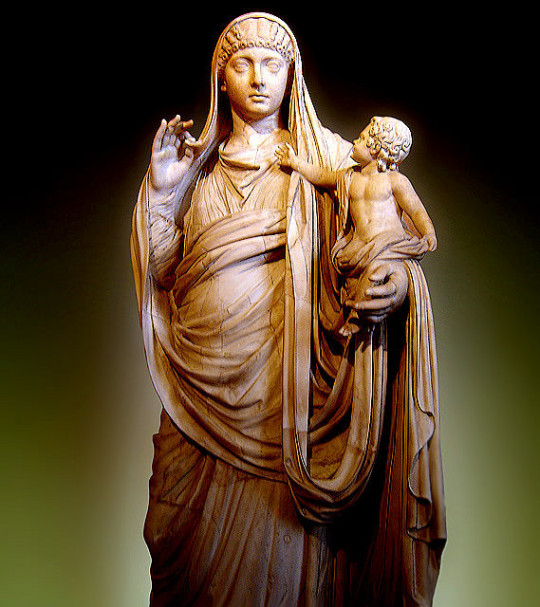
Britannicus
Britannicus (41-55 CE) was the second child and only son born to the Roman emperor Claudius (r. 41-54 CE) and Valeria Messalina (c. 20-48 CE). Seen as a threat by Claudius' fourth wife, Agrippina the Younger (15-59 CE), and her son, the future Nero (r. 54-68 CE), Britannicus was poisoned the night before his 14th birthday.
Early Childhood
Born on 12 February 41 CE, he was originally named Tiberius Claudius Caesar Germanicus; the name Britannicus was added after his father's invasion of Britain. In his The Twelve Caesars, the ancient historian Suetonius (69 to 130/140 CE) wrote, "Claudius would often pick little Britannicus up and show him to the troops or to the audience at the games either seated on his lap or held at arm's length" (197) Claudius had a son by his first wife Urgulanilla, but the boy died accidentally before coming of age, and Britannicus became the obvious choice to assume the purple upon the emperor's death. However, this would soon change when Claudius married his niece Agrippina the Younger (15-59 CE). The emperor's new wife brought with her a hidden agenda; she had high aspirations for her son, the future emperor Nero (r. 54-68 CE).
Agrippina the Younger was the daughter of Emperor Tiberius' (r. 14-37 CE) nephew Germanicus (15 BCE to 19 CE) and Agrippina the Elder (14 BCE to 33 CE), making her the great-granddaughter of Augustus (r. 27 BCE to 14 CE). Her marriage to Gnaeus Domitius Ahenobarbus produced one son Lucius Domitius Ahenobarbus, the future Nero (b. 37 CE). Gnaeus, who died when Nero was three, was extremely violent and was described by his contemporaries as "a despicable character." Two years after Domitius' birth, Agrippina was exiled by her brother Caligula (r. 37-41 CE). After Caligula's assassination in 41 CE, one of Claudius' first acts was to recall her. Her strong ties to the Julio-Claudians would pose a serious challenge to young Britannicus' position as the emperor's heir and, unfortunately for Britannicus, the highly aggressive Agrippina would stop at nothing until little Domitius upended his position. According to Matthew Dennison in his The Twelve Caesars, Agrippina "was not distracted by bodily appetites; arrogance and an undistracting focus steadied her performance." (156)
In 40 CE Domitius' father died of dropsy. Upon her return to Rome from exile, the widowed Agrippina married Gaius Passienus Crispus, who had recently divorced Gnaeus Domitius Ahenobarbus' sister Domitia. The marriage ended before 47 CE, possibly due to poisoning. Agrippina inherited his vast wealth, making her extremely rich. Widowed twice, she set her sights on husband number three: her uncle Claudius. Claudius showed little interest in obtaining another wife; there was still strong competition for the old emperor: Aelia Paetina (his second wife) and Lollia Paulina (Caligula's third wife). Lollia would later be exiled on the orders of Agrippina where a suicide would soon follow. However, Claudius' financial secretary Marcus Pallas favored Agrippina, and on 1 January 49 CE, she became Claudius' fourth wife.
Having married the emperor, her next objective was to secure the adoption of her son, and on 28 February 50 CE, Lucius Domitius became Nero Claudius Drusus Germanicus Caesar. Suetonius wrote, "In his last years, Claudius made it pretty plain that he repented of having married Agrippina and adopted Nero" (204). Realizing, the possible danger posed by Nero and his mother, Claudius told his son repeatedly "to grow up quickly." With the adoption of Nero secured, Agrippina turned her attention to the one serious obstacle to her son becoming the emperor: Britannicus.
Continue reading...
31 notes
·
View notes
Note
Do you have any thoughts about how to do fascism in Arthuriana? Like partially inspired by T.H. White I was thinking of writing Lucius as a sort of combination of a 30s Dictator and the crusading ideal that you get in Medieval literature, which of course looks quite repugnant by today's standards.
I've been turning this over in my head for a few days as it's a very interesting question! To start, let me talk about two versions that did it to different ends.
As you mentioned, in The Once and Future King, Mordred becomes a Hitler (or British fascist) analogue, and predicates his rise to power on persecuting Jews and Moors. I wasn't sure how I felt about this at first, but after thinking it over, I realized that World War II was the defining trauma of White's generation, and if he's going to write about a political faction destroying Britain and plunging it into apocalyptic war, how could they not be fascists? (Plus I got a fanfic out of it.)
On the other hand, in the 2004 King Arthur movie, which I actually overall enjoyed, they made Cerdic the Saxon their fascist villain. He orders all the Celtic women killed so that his men won't breed with them and produce more of their disgusting race...which, if you know anything about the Saxon invasion, is more or less the opposite of how it went. It's like a darker version of the 'tightlacing into dresses without waists' scene in Bridgerton- I'm not a stickler for historical accuracy, but I need it to at least make sense in the world that's being presented to me on screen.
So, what's the deal with fascism? I'll let Umberto Eco give the greater picture, but when I think of fascist villains, I think of three things- an "us" who is great, a "them" who are simultaneously weak and strong, and a mythic "good old days" that never really existed. Given that Arthuriana is a mishmash of time periods and ethnic groups as it is, you have a lot to choose from, both in terms of making it make sense in universe, and in terms of it feeling resonant to a 21st century reader.
If Lucius is your villain (a good choice, I think, he's not used as much as he could be) then you're positioning the "us" as either Rome or Italy. I say "either" because Malory et al had him as an anachronistic Roman emperor, but the Squires Tales series made the interesting choice of him being an Italian prince styling himself the modern Caesar. I'm not Italian, but I think this is something that politicians from Mussolini to Berlusconi have tried to position themselves as to some extent, so I think there's room to explore there.
If "us" is Rome, then "them" must be wherever they're trying to conquer. If you've ever played Fallout New Vegas, the Cosplay Roman Fascists there have "The West" as their enemy, with speeches about how they're doing a great job unifying all the disparate tribes but are hindered by the "degenerates" of the NCR and New Vegas. There are certainly tribes to go around in the British isles, any of which could be your "them" or your "future us, once then kneel." The good old days were the height of the Empire, of course, and depending on whether your Lucius is a Catholic or a Roman pagan, he can call upon a huge history of grandiose mythology to support himself.
If Mordred is your villain, then both his mythic past and his "us" could harken back to the glory days of King Uther, back when the Britons were strong against the Saxons and kings were revered for their might, not their codes of honor. The song Fie on Goodness in Camelot is dark comedy because nobody really talks like that about themselves- but they could voice the same sentiments in different language. "Them" could be Jews and Moors as in T. H. White, but you can pick any influence from the Picts to the Gauls as the simultaneously weak and strong enemy who turned Arthur into a man too soft to lead.
"Uther was a barbarian because he stole another man's wife," Mordred might say, "but Arthur claims to be civilized because he gives his away!"
And then there's that old medieval standbye- the crusades. Just what the hell time period Arthuriana takes place in changes with the writer, but having your villain either outright be a Crusader King or modeling him on one would give you a chilling model to work with. Slaughter and pillage all who get in your way, and you can justify it with ideology. Send every available one of your own men and boys to their deaths and you can do the same. And if the war never ends, so much the better, as your wartime powers never go away.
Thank you for this question, and I'll be very eager to see what you come up with!
28 notes
·
View notes
Text
Oldest recorded reference to cider is in Julius Caesar's invasion of Britain, where he found the Celts fermenting crab-apples.
Neat.
I want a cider now.
16 notes
·
View notes
Note
Frank, could you explain the causes of the French Revolution? A timeline of events would be a great bonus.
"Timeline of Events"
3.5 million years ago: first human ancestor evolved from a smaller ancestor
2.1 million years ago: Australopithecus evolved from smaller ancestors
900,000 years ago: Homo Habilis evolved from earlier human ancestors
700,000 years ago: Neanderthals first evolved from Homo Habilis
35,000 years ago: earliest Homo Sapiens sapiens is thought to have arrived in France
11,700 years ago: Late Stone Age dietary record of French Emperor Louis XVI's ancestor found near Paris, indicating the possible site of his castle Chateau Versailles
2,800 BCE: Celtic invaders migrate from what is now the Ukraine and Bulgaria
822 BCE: first Celts found on the isle of England
61 BCE: Julius Caesar arrives in what is now France and begins campaign against Celts
55 BCE: Julius Caesar captured by Gallic mercenaries on the banks of the Aisne river
53 BCE: Brennus of the city of Nassus leads first Gallic invasion of Italy
51 BCE: Pompey the Great ends Gallic occupation of Italy
38 CE: Emperor Claudius pacifies the Gauls after a Gaulish invasion of the isle of Britain
396 CE: Emperor Constantine, recognizing the influence of the Parisian countryside, transfers his capital to what is now France
476 CE: The Roman Emperor Romulus Augustulus is deposed, marking the end of the Roman Empire
583 CE: Good King Charlemagne unites the Frankish people into a single kingdom
1494 CE: the Parliament of Toulouse passes the Edict of Purification, requiring Jews to convert to Christianity or leave the country
1531 CE: Henry VIII becomes first King of England and France
1610 CE: Francis Bacon publishes the New Organon, asserting in chapters 17 and 18 that the Heavens contain a fluid which he theorizes is the component of all matter on Earth
1632 CE: Corpus Juris Civilis, the universally agreed-upon legal code of the Catholic Church, dissolved
1648 CE: Protestant forces in France defeat Catholic forces, marking the beginning of the French Revolution
1848 CE: King Louis Philippe is deposed and the Second French Republic established
1870 CE: France is annexed by Prussia and Germany
1914 CE: an assassination in Sarajevo sparks World War I
1945 CE: Winston Churchill's government publishes the Paris Protocols, detailed proposals for the creation of the European Union
1958 CE: the European Union is founded, consisting of the six member states of France, West Germany, Italy, Luxembourg, the Netherlands, and Belgium
34 notes
·
View notes
Text
In 55 BC Rome set its sights on invading Britain. Led by the formidable Julius Caesar, Roman troops landed in Kent and, using their superior weaponry, took the South.
19 notes
·
View notes
Text
The Druids ~

The Druids were a priestly class in Britain, Ireland, Gaul and possibly other parts of Celtic Europe and Galatia during the Iron Age and potentially even earlier. Information about these mystical ones is quite obscure. They left no written accounts about themselves and the aspects attributed to them are derived from descriptions left by Greek, Roman and various scattered authors and artists over time.
While archaeological evidence has been uncovered pertaining to the religious practices of Iron Age peoples, no artefacts or images have been unearthed that can undoubtedly be connected with the Druids.
Various recurring themes emerge in a number of the Greco-Roman accounts extant, typically including that they performed human sacrifice, believed in a form of reincarnation and that they held a high position in Celto-Gaulish society.
Various passages within the writings also report of what would now be termed homosexual acts among them and a culture of homo-eroticism within their class which related to the warriors with which they seemed closely associated - perhaps a sexo-spiritual element of nature/power/fertility/virility-based beliefs. Little is actually known about their practices, except for their “ritual of oak and mistletoe” as described by Pliny the Elder. Sexual workings may have held a place in their ceremonies and it is thought by some likely that they held semen vitally sacred as the essence of life.
The earliest known reference to the Druids dates to 200 BCE, although the oldest actual description comes from Caesar in his ”Commentarii de Bello Gallico” (50’s BCE). Later, other Greco-Roman writers also described them including Cicero & Tacitus as well as Pliny.
Following the invasion of Gaul by the Romans, Druidism as a practice or religious construct was suppressed by the government under the 1st-century emperors Tiberius and Claudius. After this imposition, references of it disappeared from the written record by the 2nd century.
There are also stories created by later medieval writers. In about 750 CE the word “Druid” appears in a poem by Blathmac, who in writing about Christ says that he is “better than a prophet, more knowledgeable than every druid, a king who was a bishop and a complete sage.”
References also appear in tales from potentially Christianised Ireland. The Druids are characterized in the famous Táin Bó Cúailnge largely as sorcerers who opposed the coming of Christianity.
In the wake of the Celtic revival during the 18th and 19th centuries, fraternal and Neopagan groups were founded based upon ideas about the ancient ones in a movement which is now known as Neo-Druidism…
image Draia
13 notes
·
View notes
Text

Tumblr is basically where I come to geek out about things, but I still write, and this is my latest project. ☝️
The Lion & The Owl is a web serial (yep, present-tense and everything) about a vengeful legionnaire who enslaves the druid that murdered his father, bringing chaos to his household in the Lepontine Alps.
On the left is Lucius Scipio Servius, a nepo baby alpha-douche in Caesar's 10th Legion. He's the heir of a prosperous landowner, and despite his chivalrous heroics when it comes to women, he loves it when men refuse his advances because he gets off on forcing them to fuck.
*Naturally, Skipio's lonely because most gays don't like being forced.*
Our strapping golden boy takes part in the second Roman invasion of Britain, where he crosses paths with a freaky druid-in-training.
Aedan the Ancalite (on the right) is an ornery little shit who loves fight-sex. He's gangly and morose and creeps most interested men out - yet the ladies adore him because he's an expert abortionist.
*Sadly, he's lonely because most gays don't like assaulting their boyfriends before knocking boots.*
Skipio & Aedan meet first in battle and then later in a pleasantly naughty circumstance. Any good-natured kink they might've shared by a waterfall, however, goes sideways when Aedan learns Scipio's dad killed his father in Belgica.
They're posed marriage style on this cover because they got a love thing, even if it's twisted, brutal, and rapey.
You can read the serial for free at Tapas, Pixiv, or AO3 - but its main home is at Bear House Serials.
#writeblr#creative writing#web serial#web novel#tapas creator#tapas#pixiv novels#pixiv#ao3 writer#archive of our own#lgbtq fiction#historical fiction#ancient rome#roman republic#celtic britiain#druids#enemies to lovers#fight sex#present tense#writers on tumblr#writers on ao3
2 notes
·
View notes
Text
Lavender's blue (Mels Zucker x Reader)
I finally wrote something fluffy for Mels!
Rating: Teen
Genre: Fluff, Romance
Words: ~ 5,700
Warnings: Some illegal activity (theft and trespassing and there is a short scene in a prison cell) and some light innuendo, descriptions of knife-like objects as weapons but no one is attacked, also non-sexual sensory deprivation
Summary: It is almost the end of the last year of school. History class is covering the Roman invasion of Britain. Spirits are high. The reader loves Mels, Mels loves the reader. They go on a (slightly illegal) date.
read on ao3

Amy was walking next to you, a spring in her step, her voice brimming with busy determination.
“Rory has agreed to wear the soldier costume” she said “So we just need you to spruce up that text on roman gender roles and someone to make Mels finish - or rather start - her take on weaponry. Then there is no way Kaylee's stupid presentation will beat ours.”
“Hey, there is plenty of spruce in my text already!” you complained automatically.
“That is not a thing” Amy rolled her eyes at you. “And: No there isn't. You literally copied two lines out the textbook about how women were more likely to take care of the household, teach children and weren't allowed to vote. There is nothing spruced up about that.”
She might have had a point. If you were being honest, you weren't entirely sure what your text snippet had covered. During the lesson you had only half-heartedly been working on it - way more interested in Mels' jokes about roman orgies than your assignment. Way more interested in Mels than history lesson, period. Contrary to Amy, who for some reason had been excited by the prospect of yet another 'end-of-year-extra-credit-how-do-I-keep-my-pupils-occupied'-presentation project, this time on the roman empire, or roman life and culture in your case.
But you were nothing if not a good friend - and slightly terrified of Amy's wrath- so you graciously agreed: “Fine. I will write you a piece about how Romans already performed full body Brazilians if that's what you want, Pond.”
“See: That line is gold” Amy nodded with satisfaction. “Keep that in.”
“Why is this so important to you anyway?” you asked. You had thought you were all on the same page about history taught by Mr. Hilbert: It was necessary to be passed for your nearing A-levels, but that was about the amount of effort it was worth. Rory still studied and helped you all to get through, but neither one of Amy, Mels or you had ever been paying a lot of attention to it. And when it came to you, you were very okay to spend the time you got for the project flirting with Mels.
“It's the first topic in history class that interests me: Invasion of the Hot Italians!” Amy explained with great flourish and a wicked smile.
“Is that the title of our presentation?”
Amy beamed. “You bet it is.”
You chuckled, fully convinced now to invest yourself in the project if brought her that much joy.
“Fine, I promise to make an effort” you said, remembering something you had read the other day. “As long as you allow me to put in a bit on transgender Romans? There was this really interesting article in National Geographic.”
Amy stopped suddenly, grabbing your shoulders and staring at you with wide eyes.
“Y/N. That. Would. Be. Perfect” she said, stressing each word individually. “And if you could get Mels to hand in something?”
That was a bit more of a difficult request.
“I’m not sure I can do that” you admitted. “But I promise I will do my very best to convince her to take the 'Julius Caesar was not stabbed earlier because the Doctor wasn't there to initiate it' line out.”
Mr. Hilbert had given you a flowchart for the project and Mels only contribution had been to immediately write down something along those lines. When Amy had tried to throw the sheet away and ask for a new one, she had been denied, so for now her imaginary childhood friend was still part of the presentation.
Amy grimaced. At least she seemed more amused by Mels’ antiques now than during the lesson. “Wasn't it 'Julius Caesar died because the Doctor didn't save him'?”
“Not sure” you frowned in concentration, trying to recall the flowchart. “But I believe Mels should be in favour of the empire crumbling? She is very anti-autocrative figures.”
“Didn't she have a thing for Cleopatra though?” Amy asked but you just shrugged.
“Just another reason to wish Caesar gone.”
You had reached the crossing where you would normally split up and stopped idly, not ready to say goodbye yet.
Amy wrung her hands. “Well, it would be great if the Doctor did not make an appearance in my- uh our presentation.”
“I'll try my best” you promised again.
“I'm sure she'll listen to you” Amy nodded optimistically. “She loves you.”
You felt yourself smile. “She does, doesn't she?”
It was all new, you and Mels. Barely three weeks ago, she had suddenly taken the first step and asked you out. Three weeks that you had spent with nothing else than making googly eyes at each other as Amy liked to point out. You didn’t care that she was mocking you, you were too happy. Having been crushing on Mels for literal years the current state still felt acutely like a dream come true.
Amy snorted good-naturedly. “To a fault. Hey, I bet you two'll be voted 'endgame couple' in the yearbook.”
Saying that she elbowed you lightly as if she was letting you in on a secret. You however could only raise an eyebrow sceptically.
“We will not. We're way too unpopular in school” you argued.
Amy shrugged. “Well, Rory and I have voted for you.”
“Shouldn't you vote for yourselves?” It was out before you could hold yourself back. You bit your tongue, silently cursing your faulty impulse control and praying Amy would overhear your slip up. As much as you shared Mels conviction that your friends were meant for each other, you didn’t want to meddle. Unfortunately, Amy was not heading your voiceless plea.
“What do you mean?” she asked with a frown.
“Nothing” you hurried to say. “Forget I said anything…So I will get home I guess and work on roman gender roles, see you tomorrow?”
Okay, maybe you were just trying to get out of the conversation. But you really should be getting home, too, if only because Mels had been calling your landline every night for the last weeks and you were hoping it would be the same today.
“Alright” Amy agreed, hugging you tightly. “Take care, Y/N.”
“You too” you grinned, waving before turning to make your way home.
Having barely taken ten steps down the street, you recognised a familiar figure squatting on top of a little garden wall on your side of the road. You reckoned normal people would be a bit disturbed if their girlfriend – who had stayed behind at school and was supposed to be having a Spanish period right now – snuck past them and their friend on their way home to wait until said friend had left and greet them as a slightly threatening, ominous figure on a garden wall, playing with a fidget spinner they had transformed into a shuriken nonetheless. But then, normal people probably wouldn’t date Mels.
In any case, the feeling flooding your stomach at her sight was far from unease and a whole lot more pleasant.
“Mels!” you greeted her, beaming. “Good to see you. Amy has just given me the very strict instruction to make you work on the presentation.”
She smirked, pocketing the shuriken.
“That would not be half as exciting as what I have planned.” She jumped down from the wall and strolled towards you, reaching for your hand. “I want to take you on a date tonight.”
“But you can't tell Amy or Rory anything” she added hurriedly, intertwining your fingers and looking searchingly into your eyes. “Promise?”
You guessed her hesitation to inform your friends wouldn’t have anything to do with the presentation. Mels was usually very upfront about not caring about school, even when Amy, Rory and you did. You frowned thoughtfully.
“That sounds moderately concerning” you admitted. “How illegal are we talking?”
Mels chuckled. “It's not... more illegal than usual.”
“Why are you so insistent I don't tell them then?” you asked, reaching out with your free hand to caress Mels’ cheek. Like always, she immediately leaned into the touch.
“It's just something I am not ready to share yet” she said quietly and you got the feeling that she was uncharacteristically coy about it, shy almost. Whatever it was, Mels seemed to not be sure about it, as unbelievable as that sounded. And still she was inviting you, trusting you.
You bit your lip. “But you’re sharing it with me?”
“Yeah...” she pulled a face and lightly hit your front. “Don't you dare go all soppy on me now!”
You couldn’t help it, you had to take her face into your hands and kiss her. When you pulled back, she looked incredulous, like she couldn’t quite believe she deserved this. It was not the first time you had seen this expression on her but she kept insisting, it didn’t mean what you thought it did. Well, you had decided you would just make sure to make her feel like she did deserve you with all your might.
“Promise, you won’t get us into trouble this time?” you asked, already knowing what her answer would be.
“How dull would that be?”
You rolled your eyes but couldn’t suppress a grin. “Promise me then you won’t push me into a sewer again?”
“A sewer?!” Mels eyes widened in mock exasperation. “Honey, I pushed you into the canal! There is a difference, thank you very much.”
“You pushed me right next to a pipe that looked suspiciously sewer-y” you pointed out. “And have you seen Leadworth’s canal? My sneakers still smell like a dog who rolled in a freshly-fertilised field.”
“Did save you from getting arrested” Mels mused, way too satisfied with herself and you felt the strong urge to kiss that smug smile from her face.
Instead, you flicked one of her braids teasingly. “So, what? You want me to thank you now?”
She considered you for a moment, definitely more for show than anything (she had to know what it did to your heart when she looked at you this intently). Then she shook her head slowly.
“No” she said with that slightly deeper voice that never failed to make your legs feel like jelly. “I want you to thank me tonight. On our date.”
She cradled your hand in hers again, then glanced up at you through her lashes. “Deal?”
It would be so easy to give in. Too easy.
“I still haven’t agreed I owe you thanks” you managed to say, even though it came out rather hoarsely.
Mels smirked at the way your breathing had acquired a ragged undertone, caressing your throat lightly with the back of her free hand. You held your breath. She chuckled. “Haven’t you?”
You burst out laughing, partly at her arrogance, partly out of nervousness, and slapped her hand away. “You are incorrigible!”
“I know” Mels agreed without a hint of shame. “It’s why you love me.”
She had said it light-heartedly, considered it a joke, probably. But your mood switched instantly.
“It is” you confirmed earnestly. “Among other things.”
Mels froze, a fearful expression flickering over her face, so quickly you almost missed it. But when she forced back a smile onto her lips and cheerful cheek into her voice, neither of those pretends were convincing anymore. “Didn’t I tell you not to get soppy?”
It puzzled you, how it seemed so hard for her to accept your love when she kept demanding it freely.
“Maybe, I am incorrigible, too” you said softly, and Mels gulped. Then a tentative hope crept into her eyes.
“Seems, like we make quite a team” she offered.
“Seems like it” you agreed, pressing her hand.
Mels cleared her throat and let go of your hand, suddenly in a hurry to put some distance between you.
“I need to go” she announced. “But I will pick you up at eight. Don’t leave me waiting!”
“Wouldn’t dream of it” you promised.
“You’d better not” she grinned, “’cause I’ll be bringing sickles.”
“’Sickles’?” you repeated, confused, but Mels just blew you a kiss, waved and skipped away.
You chuckled quietly to yourself. Well, it was not the first weird weapon she had used to threaten you with, and you guessed it would not be the last. But whatever kind of date she had planned, you knew you were in for an adventurous evening.
-
Mels picked you up exactly at eight, punctual on the second as she always was when she wanted to be. She did not greet you with a sickle or shuriken but a silky blindfold. Your teasing remarks ignoring she made sure it was fasted securely before helping you onto her motorcycle. It was thrilling, riding through the complete darkness, the wind howling around the thick helmet and the roaring of the engine deafening you so that your grip on her leather jacket remained the only sense anchoring you to reality. When you stopped after an immeasurable time period and had taken off the helmet, your hands immediately reached up to undo the blind fold. However, Mels’ gentle touch on your wrist held you back.
“Wait a moment, darling” she whispered. “Let me surprise you.”
She helped you off the motor cycle onto mushy ground. Something tickled your ankle and you jumped.
“Where are we?” you whispered, grabbing onto Mels’ arm so as not to lose your balance. She wrapped the other one around your waist, pulling you close.
“You’ll see” she hummed close to your ear and you rolled your eyes.
“I swear, if you trying to surprise me will land me in the ER…” you murmured while you started moving on unsteady feet. There were quite a lot of things at ankle to knee height and some of them were rather prickly. You assumed you were walking through a forest. The cracking of things under your feet and quiet sounds of owls, wind rustling leaves and a faraway highway were backing up that theory.
“Oh, shut up, you are loving this” Mels huffed and you couldn’t suppress a grin.
“It is a tad more exciting than ‘Netflix and Chill’, yes” you admitted and she hummed non-committally.
“Then again, we have never done ‘Netflix and Chill’ before” she argued. “Might turn out to be loads of excitement with me.”
You sighed and almost surprised yourself by how dreamily it sounded. “I bet you could turn even ‘Netflix and Chill’ into a dangerous car chase with a questioningly legal side quest.”
“You know I take that as a challenge” Mels chuckled and you conceded:
“I would expect nothing less, dear.”
“Okay, here we are” Mels stopped you with her palm against your stomach. “Hang on a second.”
Her arms left you and you heard her rummage through her backpack. Then she pressed something heavy with a wooden base into your hand.
“Careful with that” she breathed, then went to untie the blindfold. You knew her well enough to heed that advise. So you did not dare to move your arms before you could see what you were holding.
It was a sickle; an old, rusty sickle with a serrated, curved blade that shimmered dimly in the feeble light. You gulped.
“Mels?” you choked out. “What is this?!”
“I told you I was bringing sickles” she shrugged and when you looked at her, you saw that she was holding one of her own. You couldn’t make out her features properly but assumed she was sporting an amused expression at your shock. Her voice sounded entertained at least.
“Relax!” she told you, reaching for your free hand. “We're not killing anyone... Or anything.”
“Ideally” she added as an afterthought and your slightly settled heart jumped into your throat again.
“Ideally?!” you shrieked.
“Sorry, context:” Mels coughed, pressing your hand reassuringly. “We're using the sickles to harvest.”
She used her sickle to gesture before her. You were standing next to an open field of knee-high plants, as you realised now. “And if we do it right, we won't kill the plants. That's all. No murder involved…this time.”
“Are you taking me on a foraging date?” you asked, slowly catching up.
“Nah, we're stealing from a farm” she grinned. “But same thing, I guess.”
“Aw, Mels!” Now this was just sweet. And a lot more your thing than any other possible activity involving sickles. At least so you hoped.
Mels voice suddenly turned sharp. “If you laugh, I will break up with you. I'm not even kidding.”
“I would never laugh at you” you promised. “And definitely not when you are holding a sharp sickle.”
“Good call.”
Mels lead you onto the field that turned out to consist entirely of lavender plants. She took out a white canvas, spreading it in between two rows of lavenders and gesturing for you to sit down on top. Then she carefully explained to you how to cut the stems, making sure you understood where to grab the flowers and how to hold the sickle as not to cut yourself. It looked very easy when she did it but your first tries turned out rather clumsy. Still, you immediately felt the calming effect of the activity. The feeling of the hard and delicate stems in your hand, the pervasive smell of lavender in the air, the silence of the rural night, the repetitive movements, Mels’ familiar presence at your side as she cut the stems with deadly precision.
“You are scary good at this” you remarked, a little rueful for disturbing the silence.
“Well” Mels mused, glancing at you without faltering in her swift movements. “It's not so different from decapitating goons. As you know I'm a secret superhero, so I've had practice. I would tell you more but then I'd have to kill you with this sickle. Like I did with Andrew and Sabrina yesterday.”
“I know you are joking but at least half of our class actually believes stuff like that” you said, stopping in your work to admire her skill instead. “And I'm still undecided which side I'm on.”
“My side, I hope.” Mels gathered a larger bundle of flowers, expertly fastening them together with a hair tie.
“Always” you smiled. You went to cut the next handful, but stopped again, looking back at her. “Why are you really this good at lavender harvesting, then?”
She shrugged. “I've come here before, watched the other patrons pay horrendous amounts of money to be allowed to do this. But they got shown how to cut the stems, so now I know it too. And then I stole some sickles and practiced on my own at night.”
Her voice turned teasing again. “All so I could impress you with my skills.”
Well, she had definitely excelled at the impressing part. Or maybe that was just her and you would be impressed by anything she did. Now, that was a thought too embarrassing to bring up in the middle of a field.
“I would never have guessed you were into farming” you said instead. “But it suits you. I like it.”
“I guess I've found it rewarding to do stuff with my hands” she admitted. “And calming somehow. To concentrate on a simple task. And then have something beautiful in the end. There's something to it.”
You knew exactly what she meant, but before you could say so, Mels shook her head.
“I don't know” she huffed. “It sounds stupid when I say it out loud.”
“It really doesn't” you asserted, tapping lightly against her side. “Hey, maybe you could do something like this after we've finished school!”
She stopped, the sickle resting on the stems. She looked at you, then back at her hands.
“I have honestly been thinking about that” she said quietly. “Don't laugh, but-“
She stopped herself again and you reached out to touch her arm. “You know I would never.”
Mels breathed out loudly. “I've thought about studying archaeology.”
You blinked. “Archaeology? I can actually picture it.”
“Yeah, you into that?” Mels chuckled and that low and flirty tone was back in her voice, chasing the precious vulnerability away.
“You as Indiana Jones?” you asked, suppressing a shiver that the mental image sent down your spine. “Definitely.”
She hummed contentedly and continued cutting the plants. “Well now I have to do it.”
You smiled, but couldn’t let the subject drop before she knew how earnest you were in supporting her.
“Seriously though Mels” you reaffirmed. “I think, it's a great idea.”
“Hm” she shrugged “Well it's not gonna happen anyway. But it's fun to dream sometimes.”
“Of course, it can happen” you insisted. “You just have to make a little effort and you will sail through the A-levels. You are incredibly smart, Mels.”
“Is that your pitch to make me work on Amy's presentation?” she laughed too brightly. “Nicely played.”
“No, I am serious” you tried again. “I really believe- ”
“Come on, you've got to look at that sky!”
Mels suddenly dropped her sickle, throwing herself at you and toppling you over. Your sickle fell out of your hands too and you were lucky neither of you got injured. Mels came to lay on your chest but she didn’t give you an opportunity to recover, her lips hungrily claiming yours. Your eyes closed of their own accord, your hands wandered into her hair and then you found yourself sighing into her mouth while you enjoyed the feeling of her weight pressing you into the soft, canvas covered grass, grounding you. After a while, she pulled back, her smile hovering a few centimetres above you.
“I thought I should be looking at the sky” you said hoarsely.
Mels chuckled, her eyes never allowing yours to stray away. “Aren't you?”
You snorted. “You are so conceited.”
“You love it.”
She pressed another soft kiss to your lips, then she rolled off you and climbed into the next row between lavender bushes. With a sigh she let herself fall onto her back, disappearing behind the plants. Something shuffled through the leaves towards you and you had almost shied away when you realised it was her hand, searching for yours. You intertwined your fingers, your gaze finally straying to the sky. It was very clear and millions of stars were twinkling down at you. Mels had been right, it was quite a sight.
Your caressed the back of her hand with your thumb and pleaded: “Explain the constellations to me again?”
“Alright” Mels agreed. Her voice was very clear, as if she was right next to you and not separated by the bushes. “You seeing Ursa Major?”
“Hang on...” you scanned the sky. “Yeah, found it.”
“Well done” Mels praised and you bit your lip. “So, if you follow the axis in the back upwards then...”
“I get to the north star” you remembered proudly. “Found that one too.”
“You seeing the Orion Belt as well?”
“Was that the one that looks like a W?” You had to admit the memories of Mels last lesson on astronomy were rather vague from this point forth.
“No, that's the Cassiopeia” Mels corrected patiently. “The Orion Belt are three bright stars in a line, Alnitak, Alnilam and Mintaka.”
You scanned the sky but quickly decided that you did not know which stars she meant. “I can't find them.”
“That's because at this time of night they are only visible later in autumn” she explained.
“Mels!” you complained, reaching over with your free hand to slap her arm playfully.
“I'm sorry” she said, sounding not sorry at all. “But Cassiopeia is there, can you see her?”
“Yeah” you smiled, tracing the slightly skewed ‘W’ with your eyes.
Mels continued explaining constellations to you, letting you search for them and making sure you had found the right one before moving on. You reached for one of the bouquets you had created from the lavender, smelling the little buds and picking at broken stems while you listened. Her hand in yours was warm, her voice dancing through the air, almost making you believe the stars were only shining for the two of you tonight.
“They are so beautiful” you murmured after Mels had drawn out the Swan’s flight along the milky way for you. She hummed in agreement.
“Imagine if you are travelling through space” she mused, “they will look differently all the time because you are changing your position relative to the stars. You can't even use star signs to navigate. Nor the cardinal directions, obviously.”
“I've never thought about that” you admitted, impressed.
“I have” Mels said. “Loads. Imagine if you are also traveling in time, the stars will keep rotating and exchanging places. How would you begin to know where you are? You get dizzy even thinking about it.”
Oh. Now that sounded familiar.
“Is this about the Doctor again?” you asked.
Mels didn’t even seem to have heard you. “He must have some sort of inner compass. Something that always tells him exactly where and when he is. Or at least his ship must have it. Otherwise, he'd constantly be lost.”
She chuckled but it sounded petty. “Maybe he is.”
“Mels...” you started, unsure, what to say. You still didn’t know why she was so hung up on Amy’s imaginary childhood friend. Especially since Amy herself preferred not to speak about him.
“I think I might have it as well” she continued, still ignoring you. “A feeling for it all. It feels like it's dormant, but if I could just concentrate enough, I could feel it. All that time. All that space. The gravity pulling it all into order.”
It seemed to you as if she believed in those ideas. More strongly than in possibilities of studying archaeology at least.
“Do you think there is a difference between gravity and love?” she asked and despite yourself you smiled. Because after all, why not? Why shouldn’t you call that pull you felt towards her ‘gravity’?
“Right now?” you asked. “No.”
“Me neither.”
Mels pulled at your hand and then she suddenly emerged over the lavender blossoms again. She climbed back on top of you, sitting up and looking at the sky. Her eyes were shimmering like the stars themselves were reflected in them. She looked down at you and her hands reached out for your face, as if on instinct. No, not for your face, for your temples. For some reason you got the strangest feeling, like something important would happen once she touched you. Your breath caught in your throat.
Suddenly, Mels froze, her hands hovering in the air. She jumped, covered slightly and looked around. And then you could hear it, too. Barking. A voice. A faint light flickered over the top of Mels head, only a second. A flashlight.
“The farmer” you whispered in unison.
Mels wide eyes caught yours again and both of you burst out giggling. The voice grew louder, the barking closer, you started hearing heavy steps. The flashlight flickered your way again, your heartbeat picked up.
“I knew, this was going to end this way” you snickered, while Mels pulled you up and you hurried to gather canvas, lavender bouquets and sickles in your arms while never letting go of the other’s hand. “It always does with you.”
“Oh, shut up, honey” Mels snorted, pulling you away from the dark, harsh silhouettes blustering your way. “Shut up and run.”
-
“Do you remember our lavender date?” River asked you one night.
You were lying together on the cot in her cell. Which meant you were mostly lying on top of your wife, as the small frame barely admitted one person. River was right, Stormcage could definitely improve its hospitality for visitors. Strange, it was almost as if they didn’t plan for overnight stays of spouses.
Your head had been resting on her belly, your hand drawing lazy patterns onto the skin where her shirt had ridden up. But now you raised to your elbow, squinting up at her.
“Of course,” you said. “It was the first time you told me you were becoming an archaeologist.”
She quirked an eyebrow. “You remember that?”
“Yeah” you nodded. “It was the first time you talked about your future in a positive way. It gave me hope.”
The right corner of your mouth twitched cheekily as you added: “Also, I might have a thing for archaeologists.”
She laughed and the sound vibrated against your chest. “I'm sure you do, Love.”
“I even kept my bouquet” you said. “Dried it and hung it up. It's on the wall in my TARDIS room now, actually. I liked looking at it and imagining you – Mels, I mean - could come travel with us during those first days.”
She smiled. “I made mine into a moth pillow. Well, I had Dad make it into one. I'm not too skilled with a sewing machine.”
“Don't remind me” you groaned. “I am still mourning that top.”
“Would you like to go back?” River asked, reaching out to caress your cheek.
“To you trying to fix my clothes?” you frowned. “Darling, I mean this the nicest way but I won't ever let you near my clothes again when you are holding yarn and needles.”
She rolled her eyes, slapping your cheek lightly.
“To the lavender field” she clarified. “To the night of our date.”
“Crossing our own timestreams you mean?” you teased.
She shrugged innocently with one shoulder. “I'm not telling the husband if you aren't.”
“You're a very bad girl, River Song” you smirked.
“Only for you” she purred. You knew she was aware you had always been unable to resist that voice. But you couldn’t bring yourself to care.
Ten minutes and one ride via vortex manipulator later you were watching your younger selves flee their scene of crime hand in hand. You distantly remembered thinking that you might get Mels to work on the presentation with you after all while disappearing into the forest. You had been very wrong.
“You know you saved me back then?” River asked, interrupting your reminiscing. “Probably saved the Doctor, too, come to think of it.”
“I didn't do anything?” you wondered, leaning into her and resting your head on her shoulder. “And I remember precisely that you saved yourself and him. And countless other people since then.”
She slung an arm around your waist and you remembered how Mels had also loved to do that back in the day.
“You loved me” River said, “when I was convinced, I could never be loved. Not by my parents, not by Kovarian, definitely not by the Doctor. Not even by myself. You showed me that there was good in this world. Even for someone like me.”
“Amy and Rory loved you too!” you insisted, pressing a kiss against her shoulder. “Very much.”
“But they didn't know me” she argued. “They didn't know who I was.”
“Neither did I?”
“Yes, you did” she said. “You loved Mels. And that was all I had to be for you. Amy and Rory loved Mels but I was their daughter and I was convinced, had they known, they would have hated me.”
She sighed. “They do hate me a bit now that they know. I don't blame them. And they try not to show. But of course, they do. Hadn't I been myself, they might have had a daughter.”
“River...” you looked up, searching for words of comfort in her familiar face, but she didn’t give you time to find them.
“It's okay” she smiled sadly. “I just wanted to say: to you knowing who I was did not change anything, not really. And I knew that before. And that was so important. You were the one person whose life I wasn't destroying. The one person for who being myself - being Mels - was enough. The only person I could love fully and whose love did not taste bitter in return.”
She reached out to cup your face. “That gave me so much strength. And I think it gave me the ability to believe in what the Doctor was offering. That there was another way for me. That I wasn't a monster. That I could be loved. Because I already was. Unconditionally. With everything I was.”
Tears were glimmering in her eyes and you gulped. “I did not realise...”
“Of course, you didn't” her thumb ran over your cheek in gentle caresses. “But in a way your love was one of the things that made me decide to save him in Berlin. Which in turn saved me. And it helped me get through the time before. So, thank you.”
“Thank you” you said. “For trusting me enough to rely on me.”
She pressed a kiss to your lips and when she pulled back, her smile had turned playful.
“So...” she drawled, nodding towards the field. “How about we see if we can enrage that farmer further?”
You grinned. “You think they will recognise me?”
“I doubt it” she said, “but I sure hope so.”
“It would definitely blow their mind” you chuckled.
River shrugged. “They might believe you to be your own child... Or grandchild.”
She winked at you and you gasped in mock exasperation.
“Watch it, Song!” you warned, pinching her arm.
“Come on, Dear” she crooned, enveloping you in her arms again. “You know I like the gray on you.”
“I do” you pulled back to smile at her. “And I like that we look the same age again.”
“Same apparent age and same mental age” River agreed. “Shame those two don't match up, though.”
“How do you mean?” you asked.
“Well, we're still behaving like teenagers” she explained, offering you another wink, “snogging in a field of lavender.”
“Ah” you understood, nodding sagely, “shame for the farmer then, not for us.”
“Obviously” River grinned. “Shame for them. Us two? We are brilliant.”
“Yeah, we are” you sighed happily, stepping back but pulling her with you by her hand. “Let's go steal some lavender, then? You still carry those sickles around?”
She snorted, following you onto the fragrant field. “Of course. What kind of a woman doesn't?”
Thank you so much for reading! Reblogs and comments are very much appreciated ❤
#mels zucker#dw fanfic#doctor who#river song#melody pond#reader insert#amy pond#stargazing#lavender#river song x reader#mels zucker x reader#doctor who fanfiction#for fairness reasons there is some amy x reader at the beginning this time instead of rory x reader#If I do write the third one of these we will go back to being rory's bestie though
31 notes
·
View notes
Text
Legendary Warrior Women of the Ancient World
Once upon a time, there were women who challenged the might of empires and the laws of men.
They beckoned a world where the whisper of a woman's voice could quake the thrones of tyrants.
Let's delve into these legends from antiquity. 🧵⤵️
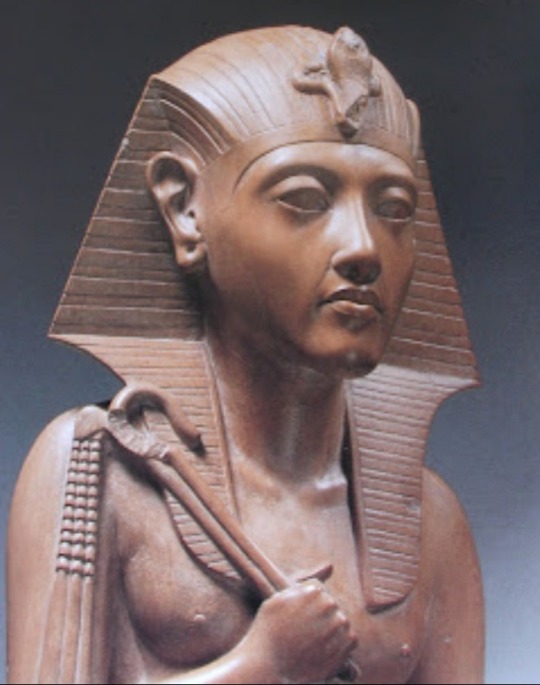
Hatshepsut
The fifth pharaoh of the Eighteenth Dynasty of Egypt, Hatshepsut reigned longer than any other woman of an indigenous Egyptian dynasty.
She was one of the most prolific builders in Ancient Egypt.
To legitimize her reign, Hatshepsut claimed she was divinely conceived by the god Amun, who appeared to her mother in the guise of the pharaoh Thutmose I, her father.
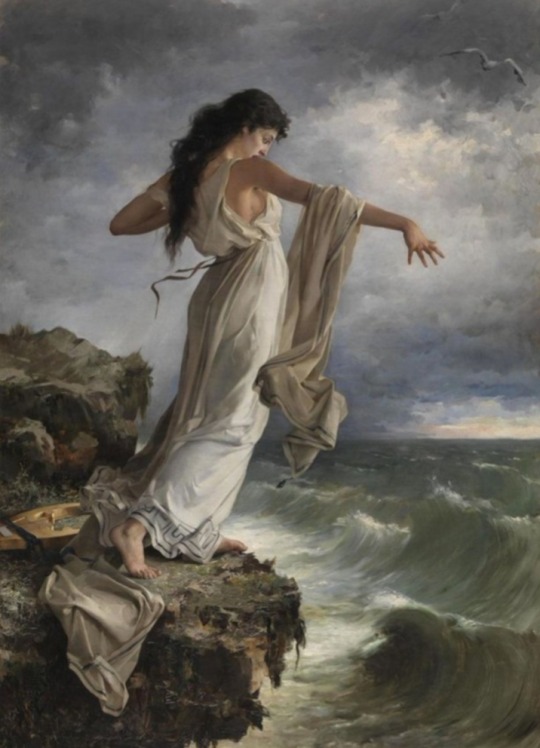
Sappho
An ancient Greek poet from the island of Lesbos, Sappho is celebrated for her lyric poetry, which explores love and passion.
Legend says that Sappho leaped from the Leucadian cliffs due to her unrequited love for Phaon, a ferryman, demonstrating the depth of her emotional expressions that permeated her work.

Artemisia I of Caria
A queen of the ancient Greek city-state of Caria and an ally of Xerxes I during the Second Persian invasion of Greece.
In the Battle of Salamis, Artemisia was so cunning in combat that she intentionally rammed her ally's ship to escape the Greeks, convincing them she was an ally and thus avoiding capture.
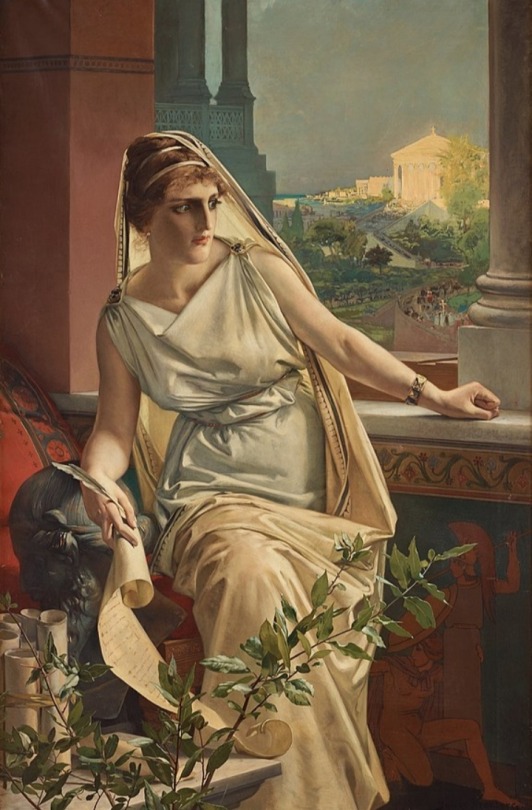
Hypatia
A mathematician, astronomer and philosopher in Alexandria, Egypt, Hypatia was a renowned teacher and thinker.
Hypatia was known to drive through Alexandria in her chariot to deliver public lectures on philosophy, defying the gender expectations of her time.
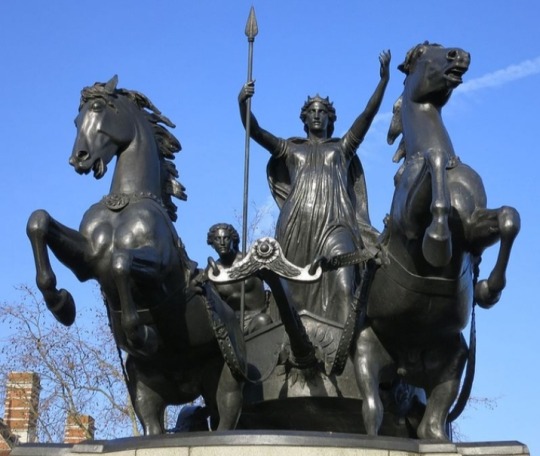
Boudicca
The warrior queen of the Iceni tribe who led a major uprising against the occupying forces of the Roman Empire in Britain.
After the Romans flogged Boudicca and raped her daughters, she rallied her tribe and neighboring tribes for revenge, resulting in the destruction of Roman settlements and the decimation of the Roman Ninth Legion.

The Trung Sisters: Trung Trac and Trung Nhi
Vietnamese military leaders who rebelled against Chinese Han dynasty rule, becoming enduring symbols of resistance.
The sisters, after witnessing the suffering of their people under Chinese rule, famously declared their independence by proclaiming:
"All the male heroes bowed their heads in submission; only the two sisters proudly stood up to avenge the country."
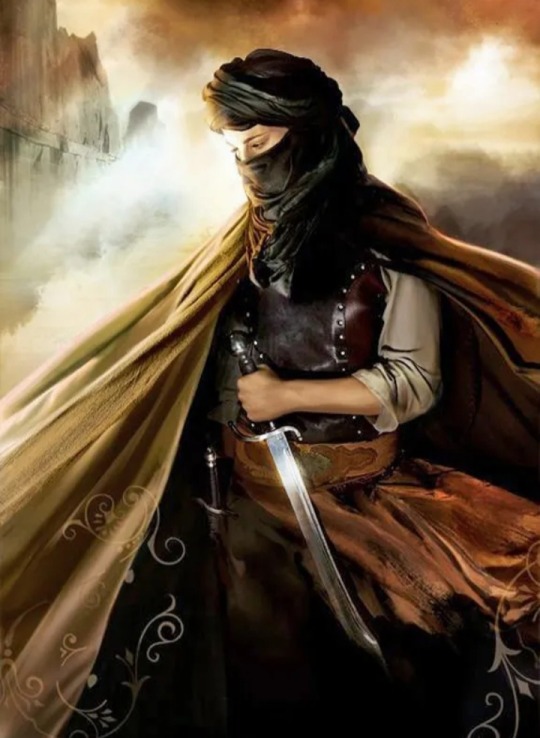
Khawlah bint al-Azwar
A legendary female Muslim warrior, she fought alongside the early Muslims in the battles against the Byzantine Empire.
Khawlah famously donned male warrior’s armor to rescue her brother from a Byzantine prison camp, charging into battle with such ferocity that opponents assumed she was a supernatural entity.
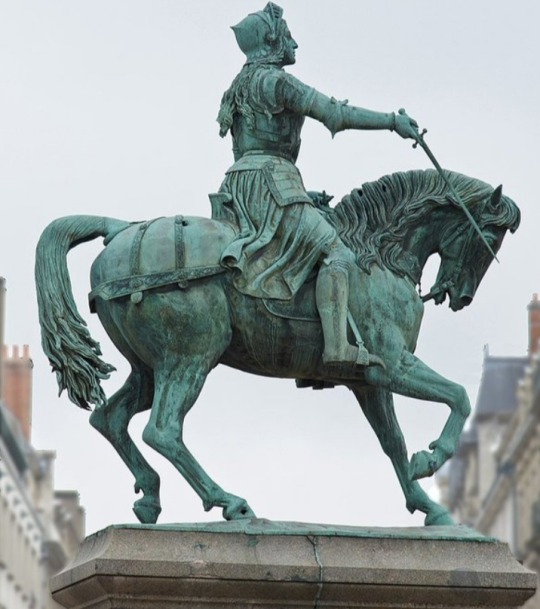
Joan of Arc
A French heroine and saint of the Catholic Church, Joan led French forces to victory over the English at Orléans.
Joan persuaded a skeptical Charles VII of France of her divine mission to save France by correctly predicting a military reversal at the Siege of Orleans, before any messenger could have reached them with the news.

Zenobia
The third-century queen of the Palmyrene Empire in Syria who challenged the authority of the Roman Empire.
Zenobia was so bold that she claimed descent from Cleopatra, positioning herself as the Egyptian queen's successor in defiance of Rome and marched her armies as far as Egypt and Anatolia.
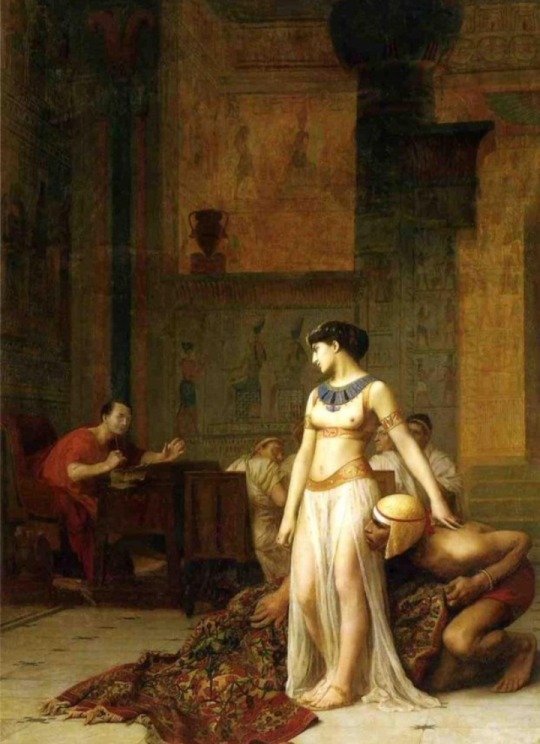
Cleopatra VII
The last active ruler of the Ptolemaic Kingdom of Egypt, Cleopatra is known for her intelligence, political acumen, and dramatic love affairs.
In a famous encounter to secure her alliance with Julius Caesar, Cleopatra had herself wrapped in a carpet (or linen sack, according to some accounts) and delivered to him, emerging to charm Caesar with her wit and beauty.
#female warriors#ancient civilizations#legendary warriors#Hatshepsut#Amun#Thutmose I#Sappho#Phaon#Artemisia I of Caria#Xerxes I#Hypatia#Boudicca#The Trung Sisters: Trung Trac and Trung Nhi#Khawlah bint al-Azwar#Joan of Arc#Charles VII of France#Zenobia#Cleopatra VII#Julius Caesar#ancient empires#ancient world#legends
6 notes
·
View notes
Text
In week 2 of my MANCENT Screening Britannia course, we're looking at screen portrayals of Julius Caesar's invasion of Britain, with the case study being Asterix in Britain. You can still join the course and receive the recording of week 1.
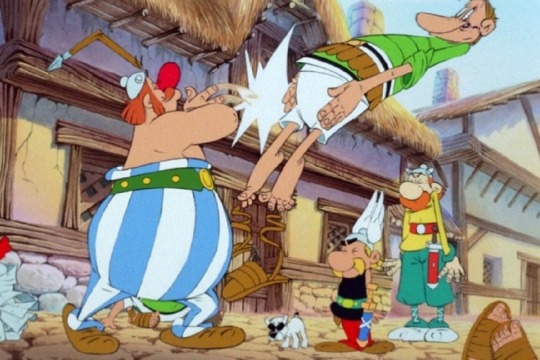
4 notes
·
View notes
Photo

Legio IX Hispana
Legio IX Hispana served with Julius Caesar in Gaul and against Pompey in the Civil Wars. Later, it fought alongside Augustus in his Cantabrian Wars and was one of the four legions Claudius took with him in his invasion of Britain in 43 CE. It survived mutiny and near decimation twice, only to recover. Although suffering heavy losses during the revolt of Boudicca, the legion rebounded and accompanied Agricola in his war against the Caledonians. The legion disappeared sometime after 120 CE.
Learn more about Legio IX Hispana
143 notes
·
View notes
Text
Why Do the British Drive on the Left? (A History Review)
—Curated By The Collector

The majority of today’s nations today drive on the right side of the road, following the rules of right-hand traffic, or RHT, including the United States, Canada, Russia, and much of Europe. But around one-third of the world’s countries buck the trend with left-hand traffic rules, or LHT. The United Kingdom is one of these nations. In fact, the UK 🇬🇧 has a long history of following LHT that dates way back into British history, perhaps even as far as the ancient Romans. But why do the British drive on the left, rather than following the widespread trend for the opposite? Read on to find out more.
Roman Custom
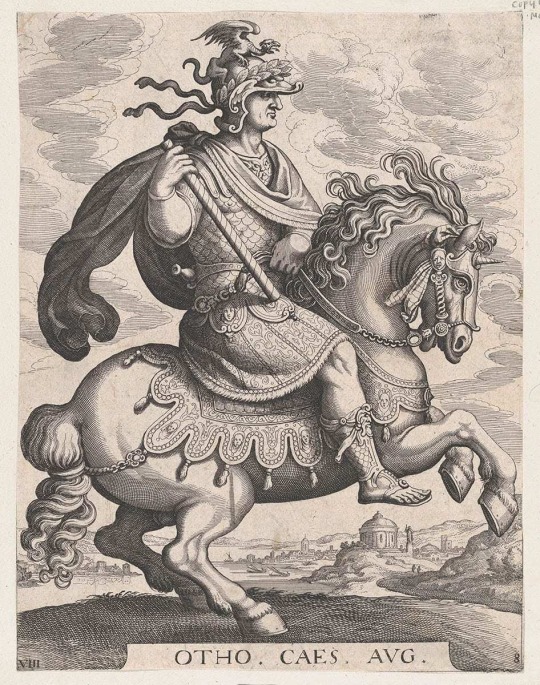
Emperor Otho on Horseback, from ‘The First Twelve Roman Caesars’, Anotonio Tempesta, 1596, Met Museum
One of the most widely circulated theories about why the British drive on the left dates back to ancient Roman times, even before cars and designated roads existed. Back then, travelers riding on horseback faced the constant threat of invasion or mugging. Because the majority of Roman people were right-handed, riding horses on the left meant their right, dominant hand could be ready to draw out a sword in the event of an unexpected rival riding towards them. History suggests Roman soldiers kept up the tradition in larger groups by always marching to the left. The practice was passed on by subsequent civilizations through the ages.
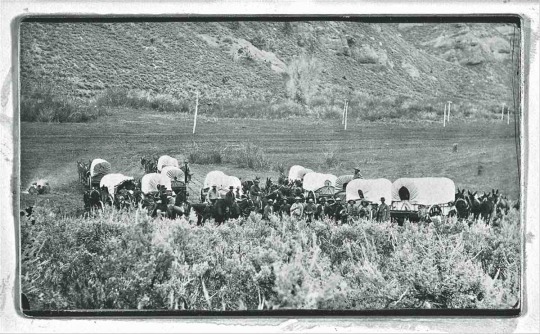
The Salt Lake Cutoff, Charles Carter photo, via True West Magazine
In other nations, particularly Canada 🇨🇦 and the United States 🇺🇸, meanwhile, goods were often transported on large wagons driven by multiple horses. Drivers would sit on the left, and whip their horse with their right hand. Riding on the right side of the road meant drivers could see oncoming traffic more easily, and avoid whipping anyone who crossed their path. The practice of driving on the right thereby became common practice.
It Was Written into British Law

Portrait of Pope Boniface VIII, who first recorded official British driving rules
The first officially sanctioned rule for driving on the left was enshrined by Pope Boniface VIII in 1300 CE, when he declared that all traveling pilgrims visiting the Roman Empire must remain on the left. In 1773, as British roads became more developed and congested, the government brought in the General Highways Act, which stated that all horse riders, farmers, coachmen and lawless highwaymen must remain on the left side to avoid any nasty collisions, even before cars had been invented. Just over a century later, the 1883 Highway Act wrote British driving rules into law, making it a crime for anyone caught driving on the wrong side, even though no one was riding around with swords on the roads by now.
British Cars Were Designed with Drivers on the Right

The interior of a classic British car showing the driver’s seat on the right side
One of the trickiest aspects of adopting different driving rules from one country to the next is adjusting to driving on the other side of the car. British cars were, and are, designed with the driver’s seat to the right, so that the driver riding on the left side of the road can see the traffic coming ahead in the opposite direction. This is often referred to as right-hand driving (not to be confused with right-hand traffic). By contrast, right-driving nations sit on the left side, thereby partaking in left-hand driving.
The Tradition Has Stuck Because Britain Is an Island
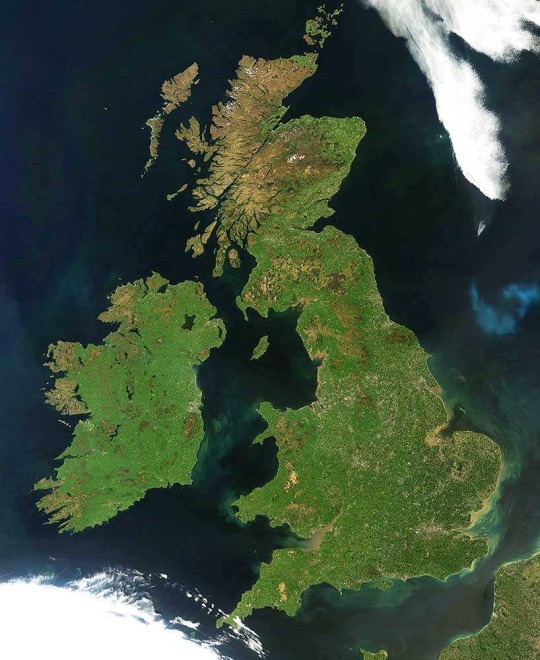
The United Kingdom and Ireland as seen from the air
One of the reasons why British 🇬🇧 people still drive on the left is because they are an island nation, with no neighboring right-hand traffic countries. By contrast, various countries who are neighbors to right-hand traffic nations have adopted their rules to make traveling from one country to the next easier, there was no need for Britain to adopt any changes since it sits as an isolated island. Several of the other left-hand driving nations are also islands, including Australia 🇦🇺, Japan 🇯🇵 and Malta 🇲🇹.
#British Driving#History Review#The Collector#LHS | RHS#Ancient Roman Times#Roman Soldiers#Canada 🇨🇦 | United States 🇺🇸#British Law#Pope Boniface VIII#General Highways Act#British Car Design#British | An Island#Australia 🇦🇺 | Japan 🇯🇵 | Malta 🇲🇹
3 notes
·
View notes
Text

Celtic Month Bonus Piece: Techtosagii
~ ~
Our seventh and final Celtic Month piece doesn’t correspond to any holiday; it’s a bonus piece in honor of the ancient Galatian Celts who invaded Greece and entered Anatolia during the 3rd Century BC. They settled in the land that would become known as Galatia; and they were by far the easternmost of the Celts. They’d later go on to become some of the first Gentile Christians, to whom Paul’s Epistle to the Galatians was written.
Before you read what the piece means to me, share what it means to _you_. I’m just the artist; you’re the beholder.
Leave a comment.
~ ~
The only Celts around today are the Insular Celts, who survived on the British Isles. Even the Bretons, who do live on the mainland, are the descendants of Britons who fled overseas during the Anglo-Saxon Invasion of Britain.
But the Celts used to be a prolific people; they once dominated Europe. The Celtic Gauls lived throughout what is now France, Switzerland, Belgium, northern Italy, southern Germany, and Austria. What is now northeastern Spain was home to the Celtiberians.
They were unstoppable warriors. A Gaulish king named Brennus invaded and sacked Rome in the 4th Century BC. Gauls later invaded and settled the Balkans, and even briefly invaded Greece, during the 3rd Century BC. At the height of their expansion, a group of Gauls known as the Galatians turned east from the invasion of Greece, and settled in central Anatolia, the region of what is now Turkey that would be known as Galatia for centuries thereafter. This was the high-water mark of Celtic expansion; the farthest afield they would ever expand.
The signature Roman sword, the gladius, was adopted from the Celts; and so were other weapons and tactics that made later Classical armies powerful. The Greeks and Romans alike romanticized the Gauls for their courage and virtue, even while scorning them as barbarians, in a way that’s highly comparable to the way European settlers in North America would later view the Native American peoples.
Following Julius Caesar’s conquest of Transalpine Gaul, the Continental Celts began to be assimilated into Latin culture, losing their Celtic language and identity; and the Celtiberians were to follow, along with their other mainland neighbors.
Even after their conquest by the Roman Republic in the 2nd Century AD, the Galatians continued to speak a Celtic language at least until the 4th Century AD, and likely until the 6th Century AD; making them among the latest-surviving Mainland Celts. They would eventually be absorbed into Greek and, later, Turkish culture; leaving the Insular Celts as the last Celts left in the world.
When the Apostle Paul wrote his Epistle to the Galatians in the 1st Century AD, it appears that Christian communities were already forming in Galatia; making the Galatians some of the earliest Gentile Christians. Christianity wouldn’t begin to spread in Ireland for another several centuries.
The exact same region of central Anatolia that became Galatia was also, about a thousand years prior, the heartland of the Hittite Empire, one of the most powerful Bronze Age nations, ruled by speakers of the Hittite language; the earliest Indo-European language of which we have written record, an ancient relative of the Celtic languages as well as most of today’s European, Persian, and North Indian languages.
I like to think that, while moving into the exotic new land that would become their home, the Galatians came upon the ruins of ancient Hittite cities, and maybe even the Hittite capital, Hattusas.
What you see in the foreground of this piece is a Hittite fortification inspired by the Lion Gate at Hattusas.
In the background, you can see the convoy of the Galatians, traveling, with their Greek spoils of war, into this new land.
In the near foreground, we see a Galatian prince and his Greek war-captive exploring the ruins.
(That penannular brooch that the Galatian prince is wearing is really more of an Insular Celtic thing; but penannular brooches are so distinctively Celtic that I couldn’t resist.)
The Techtosagii (or Textosagii, or in Latin, Tectosages) were one of the three Galatian tribes that participated in the Invasion of Greece and ultimately settled in Anatolia. Their name seems to consist of two words also found in other Celtic languages, and can be compared to Old Irish “techtaid” (“to have, to possess”) and “saigid” (“to seek out, to strive for”). It could be translated as “Possession-Seekers”, “Estate-Seekers”, “Wealth-Seekers”, or “Home-Seekers”; and that’s exactly what they were: people on the move looking for a new land to be the source and substance of their prosperity.
It isn’t known what drove them to leave their original homeland; some writers say it was greed; others say it was overpopulation; others say it was famine. In the end, they found the new home they were seeking. They would make the land their own, and their descendants would prosper there.
#galatians#galatia#gauls#hellenistic_era#hittites#hattusas#celts#celtic#spring#springholidays#digitalart#vector#mosaic#collage#inkscape
3 notes
·
View notes
Text
I’m developing this idea about a thing that bugs me in the later Assassin’s Creed games, and that it’s trying to cover too much in one story in an attempt to include every popular idea about a setting.
This isn’t new to the more recent games either--it’s just more pronounced there, especially in Valhalla. There was an idea at one point for Unity to not be in a specific time, just in a specific location--Paris--and to have the story follow an item (probably a Piece of Eden) passed on throughout history. And as a result, the final game is mostly about characters in the French Revolution, but it also opens with the condemnation of the Knights Templar several centuries earlier, and one of the side activities involves riddles left by Nostradamus. And there are the Animus Rifts set in different times in Paris’s history.
This isn’t too bad though--the main story is still about a specific location and time, and the main problem is that the history of the French Revolution is out of focus rather than that too many other historical ideas are intruding on the Plot. The things from other historical periods are deliberately mentioned as being from other historical periods.
But then you have something like Origins, which is supposed to be set in ancient Egypt and heavily feature Egyptian mysticism in the story, but they wanted to include big names people have heard of, so it’s set in Cleopatra’s time. The storyline ALSO incorporates Bayek’s religion as a driving force of his character, and him being a Medjay (despite that no longer being A Thing at this point, but he’s one of the last ones so we’ll let it slide). And because we’re including Cleopatra, they’ve also got to include Caesar, and so the conclusion of the story is about the assassination of Julius Caesar, and this story’s no longer really about Egypt (or Bayek, but that’s another thing).
[Also this isn’t getting into the expansions.]
Odyssey has a bit of this problem in that it’s about the Peloponnesian War, but ALSO wants to do quite a lot of mythology and do some stuff with the Greco-Persian Wars, but at least this time it’s all in Greece, and the mythology is what the people of the time would have actually believed.
[deep breath]
And then you have Valhalla. The main thrust of the story is about Norse mythology, and Eivor’s relationship with both Sigurd and Basim (which relates to Norse mythology). And so the game decides to cover the Norse invasion of England, the formation of the Knights Templar, the conflict between Christians and pagan Norse, the conflict between Christians and pagan Celts (which it does AGAIN in the “Wrath of the Druids” expansion, despite both the Welsh and the Irish being fully Christian at this point), the remains of Roman culture in Britain, and also Excalibur is in the game and Robin Hood gets a shoutout in a couple of sidequests.
There’s also the “Siege of Paris” expansion, which should take place like a decade after the story but doesn’t for some reason.
Also! Both Origins and Valhalla end their stories conveniently when the historical side the protagonist is on is about to lose. Valhalla at least hints that Alfred’s going to bounce back and win, whereas Origins has this weird “Hooray! We slew the tyrant and freed the Roman people!” thing going on, as if the writers forgot their high school history class on what happened after Caesar’s assassination.
I don’t know what I’m getting at here other than: historical fiction stories need more focus. As it is, it seems as if the writers can’t figure out that they want a specific time period for a place and instead try to pick out the things everyone has heard of over the course of a thousand years for one place and that’s... frustrating.
4 notes
·
View notes